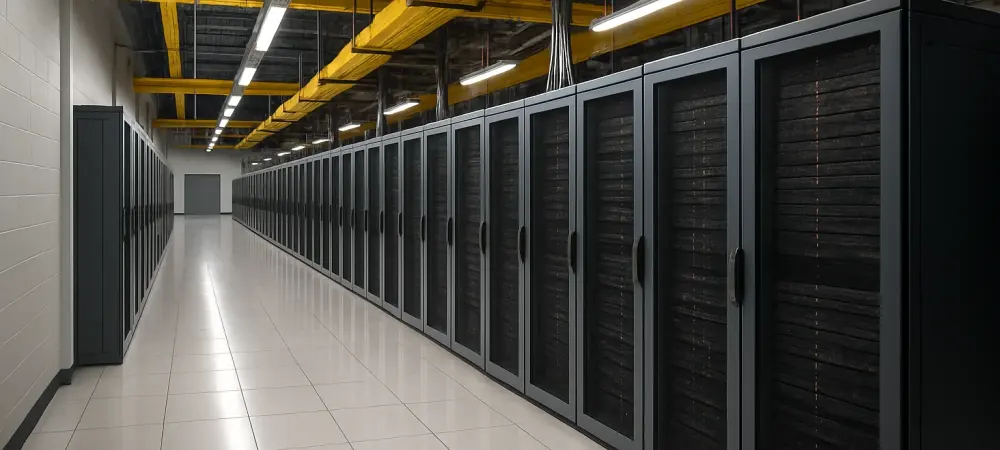Setting the Stage for a Tech Transformation
Imagine a small industrial city, once defined by manufacturing, now standing at the crossroads of a technological revolution with Michigan City, Indiana, emerging as a focal point in the Midwest’s data center surge. Recent approvals of massive projects signal a shift toward high-tech infrastructure in this evolving landscape. This market analysis dives into the implications of these developments, particularly the $832 million initiative known as Project Maize, led by Phoenix Michigan City Investors LLC. The purpose of this examination is to uncover the driving forces behind this trend, assess the economic and social impacts, and project future growth patterns in the region. By exploring current market dynamics and community responses, this analysis aims to provide a comprehensive view of how such investments are reshaping local economies and what they mean for stakeholders across the board.
Diving into the Data Center Market Dynamics
Indiana’s Rising Profile in Tech Infrastructure
Indiana has rapidly positioned itself as a prime destination for data center investments, leveraging a strategic location, robust infrastructure, and attractive state incentives. Major tech giants have already established operations in the state, contributing to a growing ecosystem that supports digital expansion. This trend is fueled by the increasing demand for cloud computing and data storage, driven by businesses transitioning to digital platforms. Michigan City, with its industrial heritage, fits into this narrative as a site for revitalization through projects like the one at 402 Royal Road, a former factory now targeted for transformation. The approvals of tax deductions and economic revitalization designations highlight a deliberate strategy to attract such investments, positioning the city as a key player in this expanding market.
Economic Impacts and Investment Scale
The economic potential of data center projects in Michigan City cannot be understated, with Project Maize alone representing an $832 million investment. State-level support, including sales tax exemptions on equipment and energy purchases, further amplifies the financial incentives for developers like Phoenix Michigan City Investors LLC. However, the economic benefits are not without scrutiny, as the anticipated job creation appears limited relative to the investment scale. This discrepancy raises questions about the true value these projects bring to local taxpayers and whether the promised revitalization will translate into tangible gains. Market analysts suggest that while the capital influx is significant, the long-term economic impact hinges on creating sustainable employment and community benefits beyond the initial construction phases.
Community and Environmental Challenges
A critical aspect of this market shift lies in the social and environmental pushback from local residents. Concerns over resource consumption, particularly water and energy, are prominent, given the high operational demands of data centers. Additionally, the transformation of industrial sites into tech hubs risks altering the cultural fabric of neighborhoods, creating a disconnect between corporate goals and community needs. The rapid pace of project approvals, coupled with non-disclosure agreements obscuring key details, has intensified distrust among locals. This tension reflects a broader challenge in the data center market: balancing economic growth with social responsibility and environmental sustainability, a factor that could influence future investment decisions in the region.
Forecasting Growth and Market Evolution
Projected Expansion and Technological Innovations
Looking ahead, the data center market in Indiana is poised for significant growth, with industry projections indicating a sharp rise in peak load capacity over the next few years, from 2025 to 2027. Michigan City’s recent approvals align with this trajectory, potentially attracting further investments from tech giants seeking to capitalize on favorable conditions. Emerging technologies, such as advanced cooling systems designed to reduce energy consumption, could address some environmental concerns, making future projects more palatable to communities. Additionally, the integration of renewable energy sources into data center operations is gaining traction, offering a potential pathway to mitigate ecological impacts while sustaining market expansion.
Regulatory and Community Engagement Trends
Another key factor shaping the future of this market is the evolving regulatory landscape and the push for greater transparency. As local opposition in Michigan City highlights, the lack of public disclosure around project details can hinder community buy-in, potentially stalling future developments. State and local policymakers may introduce stricter guidelines for environmental impact assessments and public consultation processes to address these issues. Market observers anticipate that developers might adopt hybrid models, incorporating community benefit agreements or zoning innovations to ensure that growth aligns with local priorities. Such strategies could redefine how data center projects are implemented, fostering a more collaborative approach in the years ahead.
Competitive Positioning in the Midwest
Michigan City’s entry into the data center market also positions it within a competitive Midwest landscape, where states like Ohio and Illinois are vying for similar investments. The city’s ability to leverage its industrial past while offering modern incentives could give it an edge, provided it navigates community concerns effectively. Comparative analysis suggests that regions with proactive engagement strategies and sustainable practices tend to attract long-term investments. For Michigan City, establishing itself as a hub will depend on differentiating its offerings through infrastructure upgrades and partnerships with tech firms, ensuring it remains a viable contender in this rapidly evolving sector.
Reflecting on Past Insights and Strategic Pathways
Looking back, the approval of data center projects in Michigan City marked a contentious yet pivotal moment in the local economy’s evolution. The substantial investments, juxtaposed against community and environmental concerns, underscored the complexities of integrating high-tech industries into traditional industrial landscapes. Despite the economic promise, the limited transparency and social pushback revealed significant hurdles that needed addressing.
Moving forward, strategic recommendations emerged from this analysis for stakeholders. Developers were encouraged to prioritize open communication, ensuring that project details and benefits were clearly conveyed to the public. Local officials found value in establishing frameworks for environmental accountability and community input to prevent future conflicts. For residents, active participation in public forums offered a way to shape outcomes, turning potential discord into constructive dialogue. These steps, grounded in the lessons of past challenges, aimed to guide Michigan City toward a balanced approach, where technological growth and local well-being could coexist harmoniously.

